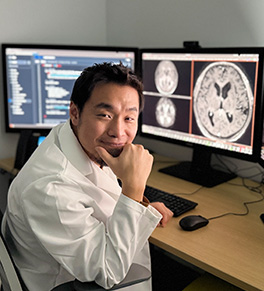
Esophageal Cancer
At the UCI Health Chao Digestive Health Institute, we offer compassionate, expert esophageal cancer care designed around you.
Esophageal cancer affects nearly 18,000 people in the U.S. each year. Because esophageal cancer causes few symptoms early on, the disease is already in advanced stages by the time it's diagnosed.
At the UCI Health Chao Digestive Health Institute, we're here to walk with you every step of the way, from diagnosis to treatment.
Our dedicated team brings together leading-edge diagnostics, advanced treatment options and a deep commitment to healing — not just your condition, but your whole self.
Symptoms of esophageal cancer
If you experience any of the following symptoms, please contact your physician. Early detection is key, and recognizing the signs can make a difference in your treatment.
- Difficulty swallowing
- Unexplained weight loss
- Persistent heartburn or indigestion
- Ongoing cough or hoarseness
- Chest discomfort
Risk factors for esophageal cancer
Risk factors may include:
- Chronic acid reflux (GERD) or Barrett's esophagus
- Use of tobacco or alcohol
- Obesity and diet-related concerns
- Prior radiation exposure to the chest or abdomen
- Male gender, particularly between ages 45-75
Looking for more options?
View all clinicians
Esophageal cancer often develops without symptoms
Don’t wait until it’s too late, schedule a screening for esophageal cancer today.
Call 888-717-4463 to make an appointment with a specialist, or
We welcome referrals from community physicians
Simply complete and fax the appropriate referral form to the Chao Digestive Health Institute.
We look forward to serving you and your patients.

Find a digestive health clinical trial
Talk to your doctor to see if a digestive health clinical trial is right for you.
Esophageal cancer diagnosis
At UCI Health, we offer a full spectrum of services for esophageal cancer, from screening and diagnosis to advanced treatment options.
- Upper endoscopy (EGD)
- X-ray with contrast (Barium swallow)
- Endoscopic ultrasound (EUS)
- Biopsy with pathology review
- Endomicroscopy and zoom magnification chromoendoscopy
Esophageal cancer treatment
Treatment for esophageal cancer depends on the type and stage of the cancer, as well as your age and overall health. The advanced treatment services at UCI Health may enable you to undergo treatment without open surgery.
When surgery is required, we use the most innovative and least-invasive techniques. This helps you achieve the best results with less pain and time in the hospital.
Minimally invasive procedures
- Endoscopic submucosal dissection (ESD) — removes early-stage tumors without surgery
- Radiofrequency ablation (RFA) — Targets precancerous or small cancerous lesions
- Cryotherapy — treats precancerous lesions and cancer with cold ablation
- Photodynamic therapy (PDT) — light-activated drug therapy for localized cancer
- Laser ablation — reduces tumor obstruction to improve swallowing
Surgical and systemic therapies
- Esophagectomy — partial or complete removal of the esophagus for invasive cancer
- Targeted therapy — HER2 (a protein found in some cancer cells) inhibitors and other molecular treatments
- Chemotherapy and radiation — often used in combination for advanced cases
Why choose UCI Health for esophageal cancer care?
When you choose UCI Health, you're choosing a recognized leader that cares with compassion and expertise.
Nationally recognized care
We are ranked among the highest-performing institutions in the U.S. for gastroenterology and GI surgery by U.S. News & World Report. This means that you receive some of the best care in the region.
High-volume expertise
We are California's leading center for ESD. This ensures you have better treatment outcomes.
Minimally invasive expertise
Our UCI Health esophageal disease specialists use the most advanced and least-invasive techniques to help you feel better. This means lower complication rates, resulting in shorter hospital stays.
Our board-certified physicians are leaders in laparoscopic and endoscopic techniques. They train other physicians in the latest methods and technologies, including robot-assisted surgical procedures.
Multispecialty team
Our team includes gastroenterologists, oncologists, surgeons, nurses and support staff. They all work closely together to provide you comprehensive, seamless treatment.
Our clinicians
Our expert team includes:
Featured Blog Posts

Tapping AI to boost cancer detection and treatment

Weight loss strategies for better health

Gastric cancer survivor credits novel clinical trial therapy
Upcoming Events
3-4 p.m. +5 more dates




